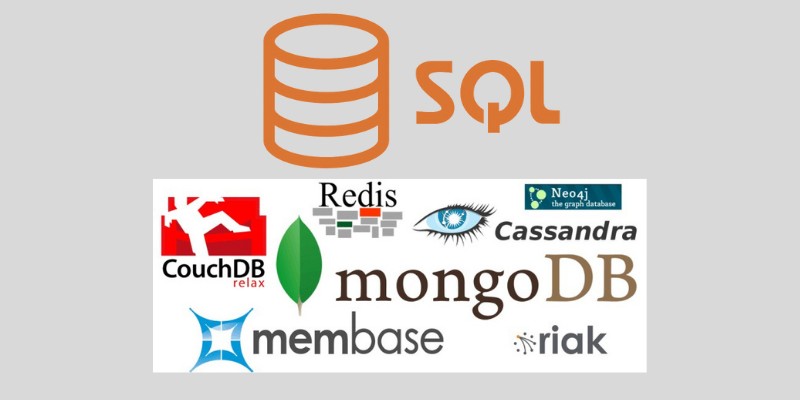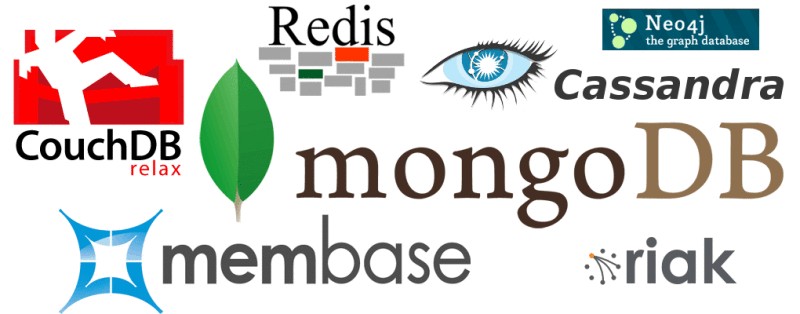The world runs on data. Every website, application, electronic shop, game etc with which you interact has a database behind it.

Whether it’s customers’ names, email addresses, and phone numbers, or it is product ID numbers and price lists; all of it goes into a database.
In this article we’ll describe and compare the two types of Database technologies, namely SQL vs noSQL Databases, their pros and cons etc.
The Database Management System
The Database Management System (DBMS) facilitates operations between the data and the end-users. The DBMS is how users and system administrators can interact with the database.
For a user to interact with the database through the DBMS, such as searching and manipulating data, they need to use a programming language compatible with the type of database it is.
Let’s see these database programming languages below:
Structured Query Language (SQL)
This programming language is called Structured Query Language (SQL). A query is a search of the database. The structure of the query determines the result the database returns to you.
NoSQL and UnQL Unstructured Data Query Language
Unstructured Data Query Language (UnQL) is a programming language used to interact with NoSQL databases. Remember, SQL and UnQL are two different programming languages. JSON and XML are both examples of UnQL languages.
What are SQL and NoSQL Databases?
SQL Databases
An SQL database is a relational database, where the data is structured in tables, rows, and columns.
SQL databases have a fixed schema, which means a structure that doesn’t change. This makes it more difficult to scale up for bigger projects than NoSQL databases.
NoSQL Databases
In 2009, Eric Evans and Johan Oskarsson gave new life to a type of database called a NoSQL (or Not Only SQL) database.
What it really means is non-relational, where data values aren’t recorded in cells, tables, columns, and rows.
Instead, NoSQL databases store data in JavaScript Object Notation (JSON) documents and use Object Relational Mapping to interact with the data.
The four main types of NoSQL databases are key-value, document, column-oriented, and graph.

Differences between SQL and NoSQL Databases
Data Structure
SQL databases follow a relational DBMS model which has a strictly defined schema, with tables having defined relationships with one another in the database. While NoSQL databases have a flexible data structure, with several ways of defining and storing the data.
Programming Language
SQL databases, of course, use SQL to interact with the data. However, many SQL databases are compatible with SQL Server’s Transaction SQL (T-SQL).
NoSQL databases aren’t stuck with using only one programming language. The most popular are JSON and XML, but the language depends on the type of data stored and the way you use it.
Data Integrity
SQL databases comply with Atomicity, Consistency, Isolation, and Durability (ACID) protocols due to the security requirements of financial transactions.
Atomicity guarantees that each transaction either fails completely or succeeds completely and as a single unit.
Consistency ensures that any transaction can only bring the database from one valid state to another.
Isolation keeps the database in the same state if the user executes code sequentially or simultaneously.
Durability means once a transaction is committed, it stays that way.
NoSQL databases on the other hand adhere to no such policy because there is no fixed-table structure. They provide eventual consistency, meaning the data becomes more consistent over a period of time (Orend, 2010).
Use Cases of SQL And NoSQL Databases
SQL Use Cases
SQL databases, being they use a pre-defined data structure, are perfect for user-oriented applications. They are a perfect fit for industries with programs requiring many join operations.
A join operation is where you join two or more tables based on a column. This includes PHP websites, banks, warehouses, shipping companies, etc.
Using SQL Beyond Spreadsheets
Financing and accounting professionals often must combine huge numbers of partial reports, which come in multiple formats, into one report in one standardized format.
Using an SQL database is perfect for this. You can clean the data at scale, merge everything using a common value, and export it all into one format using an SQL database that you query later.
Payroll Company Checks
Payroll companies use SQL databases containing names, employee ID numbers, account numbers, etc.
They must print checks for their payroll customers. If each check has a unique logo on it, then you need a table to store all the logos for each client the payroll company serves.
Instead of storing everything, including the logos, in one table, a SQL database (a relational database) uses multiple tables.
This way, it doesn’t have to search through records it doesn’t use often just to find commonly used records.
It breaks up data into tables, and if I want to print the logo on the check, SQL employs only one query to one table for that transaction.
NoSQL Use Cases
NoSQL databases are perfect for large-scale operations requiring dynamic transaction capability, such as fraud-detection.
They are known for their massive scalability, so they are perfect for corporations expecting massive product catalog expansion.
Macy’s Retail Moves to NoSQL
The retail giant Macy’s runs one of the largest retail e-commerce websites on the planet.
Previously their product catalog lived in a relational SQL database, but it limited their scalability.
Moving over to NoSQL has given them the ability to run large-scale analytical operations in real-time, as well as an ever-growing catalog of products.
Pros and Cons of SQL Databases
Pros of SQL Databases
SQL transaction queries can fetch large numbers of rows (records) from a SQL database with high-efficiency and extremely quickly.
SQL databases have a very well-established standard used throughout the database industry for decades.
Since the SQL database is already standardized, you don’t need extensive programming knowledge to interact with it.
However, there are SQL programmers that work magic with their knowledge of extensive join operations, etc. SQL queries are easier to debug for a novice user.
Cons of SQL Databases
Interfacing with a SQL database seems easy enough but isn’t always so easy. You have multiple layers of permissions, which often confuse even the best Database Administrator.
This creates a security issue. If you ask Database Administrators how many times huge secure production databases are left unguarded, you would be amazed.
Also, many SQL databases force you to use their software extensions to ensure the vendor relationship. While that makes perfect economic sense, for the software company anyway, it is what it is.
Pros and Cons of NoSQL Databases
Pros of NoSQL Databases
When it comes to non-transactional, overall performance on a database level, NoSQL databases usually outperform SQL databases. This is because with NoSQL, all of your data is located in one JSON document database.
On a transactional level, it depends on the complexity and quantity of the join operations done on an SQL database, but NoSQL will give SQL databases a run for their money there as well.
Instead of join operations, NoSQL databases use subqueries, and can push upwards of 10,000 queries a second.
When it comes to scalability, NoSQL databases are unquestionably the better choice. NoSQL databases scale out, and not upwards.
The difference is monumental. With SQL databases, if you want to scale, you must buy better hardware, more CPU’s, more this, and more that.
With NoSQL databases, you can scale horizontally. Just think of all your data in one infinite abyss. Just keep dumping it in. If you can store it, NoSQL can find it.
Cons of NoSQL Databases
NoSQL databases are relatively new when compared with SQL databases. This affects a lot of things most people don’t think about.
For example, the number of experts and knowledge bases compared to SQL doesn’t even come close. That means less programmers, less debuggers, less thinkers, less prodigies, etc.
The need for massive databases, and multiple massive ones at that, is a problem for some medium-sized businesses which decide to use NoSQL databases.
Sure, the infinite fishbowl is cool, but only if you can get it through the front door of your office.
Is MongoDB NoSQL or SQL?
MongoDB is a NoSQL database. It uses its own programming query language called MongoDB Query Language (MQL), designed for easy use, and compares MQL and SQL syntax for common database transactions.
Like any other NoSQL database, MongoDB stores data in JSON document databases which are highly specialized to a specific application.
Other NoSQL database examples include Redis, Cassandra, CouchDB, Neo4j etc.
Which Is Faster NoSQL or SQL?
Due to the number of variables involved, it is impossible to really say which kind of database is faster, but there are people who swear by both versions.
However, NoSQL is the hot topic lately, and the dynamic nature of technology would lead you to think that any type of database with a fixed, rigid structure (SQL) will be left in the dust in decades to come.
Which Is More Secure SQL or NoSQL?
Right now, like the performance issue, there are people who say SQL databases are more secure than NoSQL databases, and vice versa.
The fact remains that only SQL databases currently adhere to ACID standards. Until that changes, SQL databases are likely to remain more secure.
Summary
The best takeaway is to know exactly what you need from your data before you start building.
The best companies in the world hire people to map their entire database by hand before they push one button on a keyboard.
That’s because it costs a lot of money to change things once they are in place. We know that SQL and NoSQL both have their uses, but NoSQL seems to be the wave of the future.
Leave a Reply